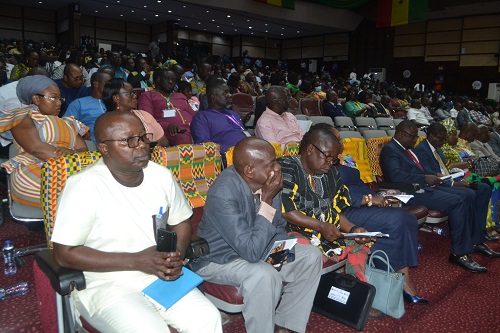That, he said, was because challenges being witnessed in our economy were short- term for which reason we could not afford to sacrifice our common vision due to short-term economic pressures.
Dr Bawumia said this in a statement read on his behalf by the Senior Advisor to the President, Yaw Osafo Maafo at the opening ceremony of the National Education Week themed “Reassessing Educational Policies for Effective Service Delivery and National Transformation,” in Accra yesterday.
“The proponents of expenditure cuts point to the economy and argues that the economy cannot support more critical social intervention programmes in our society. The Free Senior High School (SHS) education is one of key programmes advocates have argued for its abolition,” he stated.
Dr Bawumia said these proponents pointed out that the monies spent on these interventions should be abolished with monies used on them invested in other things.
The Vice President said that the “debate should not be whether our public expenditure was too high or too low but must be whether or not these programmes contributed to the welfare of Ghanaians and were essential for our national transformation.”
Dr Bawumia said despite the successes chalked in the educational sector there were still areas unshaken, hence, the government would continue to deepen access to quality Science Technology Engineering Mathematics(STEM) education across all levels in all regions and roll out communities of excellence programme across the country.
He underscored that the government would also ensure that all children acquired literacy and numeracy skills at grade four and provide opportunity for out-of-school children to access basic education and consolidation free SHS to include free Technical and Vocational Education Training (TVET).
“Expand access to tertiary education in all regions, improve learning outcomes across all levels and expand access to teacher trainee education,” he added.
A Deputy Minister of Education (MoE), Rev John NtimFordjour, said stakeholders within the sector needed to delve deeper into the various governmental policies, programmes and projects within the sector in order to help shape them to achieve the expected outcomes.
He said that was because the educational sector had the responsibility of contributing to the desired national transformation by recognising the strengths and weaknesses of the current system and prescribing strategies to address the challenges in order to give every Ghanaian child the opportunity to succeed and contribute to national development.
“For this to be successful, strategic policies must be developed and re-assessed periodically for effective service delivery,” he added.
Ms Bernice Mpera-Gyekye, National Coordinator, Ghana National Education Campaign Coalition on behalf of all Educational Civil Society Organisations in the country proposed that the government increased capitation grants, budgetary allocations to schools as well as allocations for special needs schools.
She also asked the government to strengthen the accountability of teachers, the ministry and the Ghana Education Service (GES), adding that the government should introduce a digital teacher student attendance assessment to particularly check on the punctuality of teachers.
 info@businessghana.com
info@businessghana.com


















